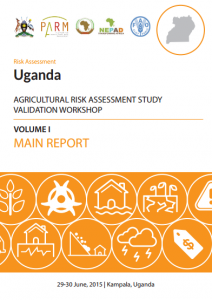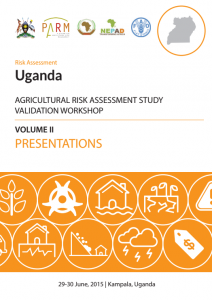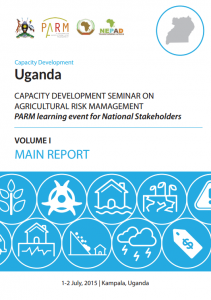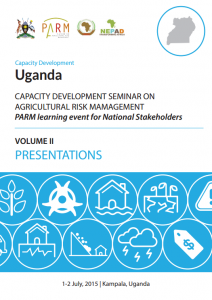
National Stakeholder Workshop and Capacity Development Seminar to strengthen an holistic agricultural risk management(ARM) approach in the country by examining impact of risks into smallholder farmers' livelihoods and share lessons
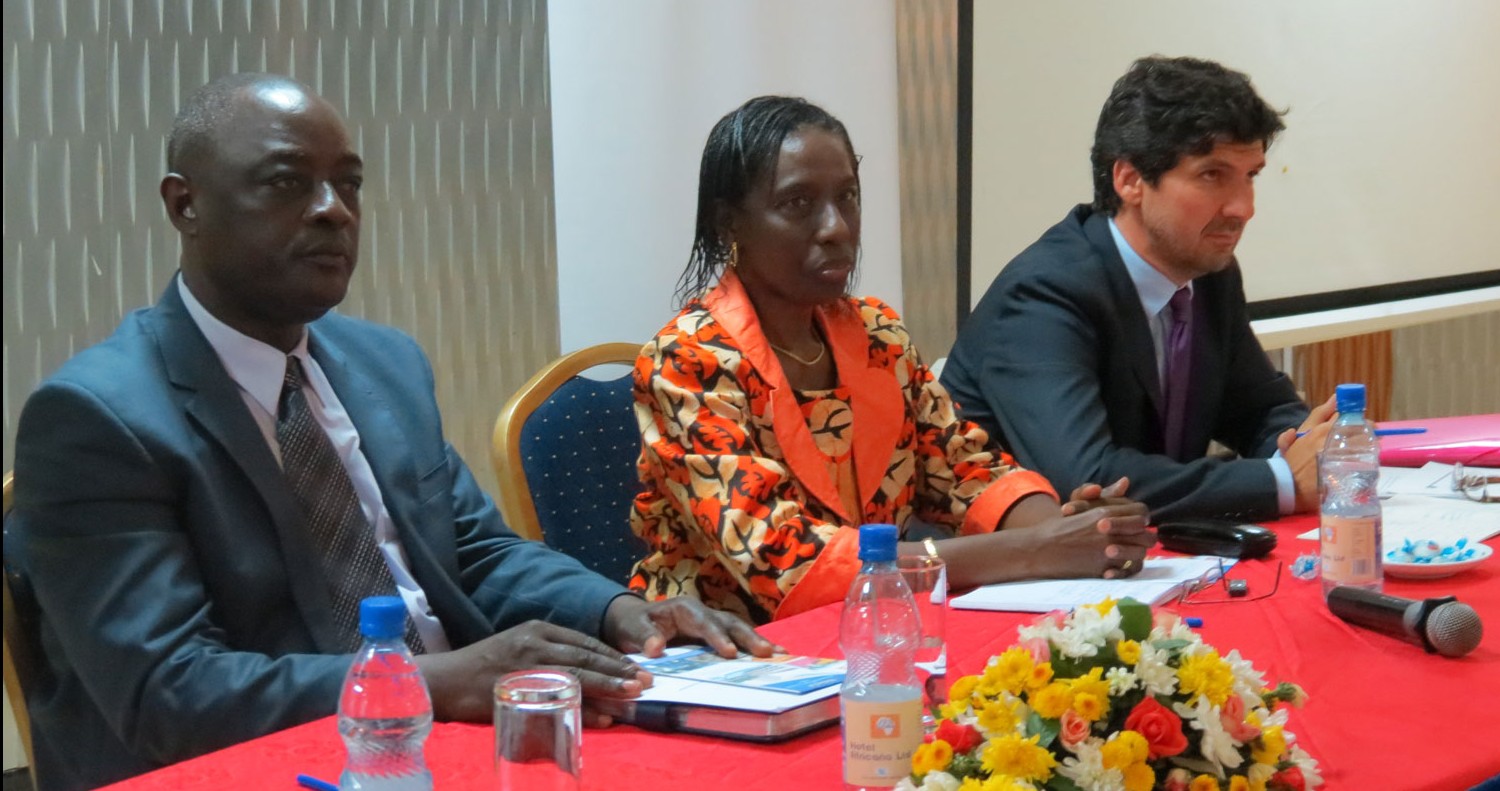
From the left: Hon. Vincent B. Ssempijja, Minister of State for Agriculture, Animal Industry and Fisheries (MAAIF), Mariam Sow Soumare, NEPAD; Jesus Anton, PARM/IFAD.
Kampala, 6 July 2015 – African countries including Uganda are highly susceptible to risks originating from various sources ranging from climate and natural hazards, market and volatile prices, including unpredictable policies and regulation.
Recurrent agriculture and food market crises have undermined the productive asset base of rural producers and increased their vulnerability to food insecurity and under-nutrition, hence reducing their capacity to adopt new technologies and innovation.
The challenge in this initiative is that risk management tools adapted to the African context are still at an early stage of development. These tools are either being designed or tested in a few countries and there is no evidence on which tool to apply under specific circumstances. The purpose of the Uganda Agriculture Risk Assessment Study was therefore to undertake a thorough identification of major agriculture risk factors in Uganda, and based on a prioritization exercise, to help identifying a combination of tools that could contribute to addressing them in a sustainable, effective and efficient manner..
The NEPAD Agency and the Platform for Agricultural Risk Management (PARM) hosted by IFAD together with FAO, and the Plan for Modernization of Agriculture -MAAIF are playing a major role in shedding more light on identification of risk factors and relevant tools and policies that will constitute the basis of a risk management strategy to be mainstreamed into the up-coming Agriculture Sector Strategy Plan (ASSP 2016-2019).
A national stakeholder validation workshop was launched on June 29 and brought together for two days participants from central and local government officials, development agencies, donors, as well as members of civil society, farmers, farmers’ organizations, extension service providers, traders, financial institutions, the private sector, and the media.
The Hon. Minister of the Ministry of Agriculture, Animal industry and Fisheries, Vincent B. Ssempijja, NEPAD Representative, Mariam Soumare, and PARM/IFAD Senior Programme Manager, Jesús Antón have opened the workshop on 29 June 2015.
Workshop Objectives
The objectives of the workshop were to present and discuss the findings of the recent country risk assessment study and information system mapping appointed by PARM and NEPAD; share experiences and lessons learnt from the different stakeholders; and prioritize the most relevant agriculture risks affecting smallholders; and identify tools to address them. This initiative will contribute to organizing and fostering partnerships among the various but scattered initiatives to bring the successful ones up to scale and share experiences and lessons learnt across the country and the region.
This initiative is part of the PARM process and NEPAD/CAADP programme of integrating agriculture risk management into the national policies. This is a priority expressed by the African Union leaders in the Malabo Declaration and by G20 leaders. Improved agricultural risk management will have a significant positive impact on agricultural investment and food security.
This holistic approach to managing risk factors helps mitigate the impact of crises and building resilience of rural producers and actors along the value chain through stabilization of production, markets and institutions. Moreover, support the creation of soft infrastructure to provide inclusive rural productive and financial services in addition to making rural activities attractive to the youth by creating a sustainable path for productivity and income growth.
This workshop is a unique opportunity to consult with stakeholders about the Uganda’s agricultural risk management system. The participants have actively interacted in working groups and have shared their knowledge and experience to enlighten the assessment of the risks and the prioritization exercise.
Risk Prioritization
The Workshop has assessed the agricultural risk exposure of Uganda, including risks related to production, markets, infrastructure, diseases and institutions. Often, risks are inter-related and the impact is increased by the constraints that farmers face, in particular smallholders.
The workshop has identified risks that are highly relevant for Uganda, such as price risks and pest and diseases of crops and livestock. Other highly ranked risks affecting Uganda, are input risks (including counterfeits), variations in weather patterns (such droughts) underpinned by climate change and post harvest losses. It is estimated that droughts has been the natural disaster with the most devastating and wide-spread impact in Uganda. In particular the 2007 drought has caused massive economic losses for food crops, cash crops, and livestock affecting hundreds of thousands of people. Floods tend to be less devastating but are more frequent. The economic impact of pest and diseases is very large if the direct yield loss (or weight loss in case of post harvest losses) and opportunity cost and expenditure incurred to control the pests and diseases are included.
Constraints contributing to increase the severity and frequency of these risks
Several constraints were identified as important contributors to increase some of these risks, in particular poor infrastructure at local level (roads and communication, irrigation) and lack of good information systems.
Regional Distribution of Risks
A number of risks are spread evenly across the country, for example, such as market price risks or input risks; other risks, such as pest and diseases, are present all over Uganda but vary according to crops grown, and climatic and production conditions.
Natural risks are sometimes concentrated in certain regions, for example droughts are more likely in the North, while flooding is mostly confined to the East and North.
Lastly, some risks are confined in specific locations, such as cattle raiding in the Karamoja region.
Impact on farmers
(Smallholder) farmers face severe consequences from risks. The impact of shocks often permanently damages the farmers’ capacity to generate income. About 36% of farmers react to crisis by selling their livestock, 20% by reducing expenditure and 12% reduce food consumption.
Evaluating the impact on small farmers is very difficult to undertake in Uganda due to the lack of good information systems at local and farmers level.
Impact on Government
The government is hit by shocks in two ways: reduced income (from taxes) and increased expenditure for emergencies.
The drought 2010/11 reduced GDP by 1.8% in 2010 and 1.7% in 2011, and the Government of Uganda estimates that the government deficit in 2010 would have been 7.5% lower and the expected surplus for 2011 would have been 7.1% higher if the rainfall deficit had not occurred.
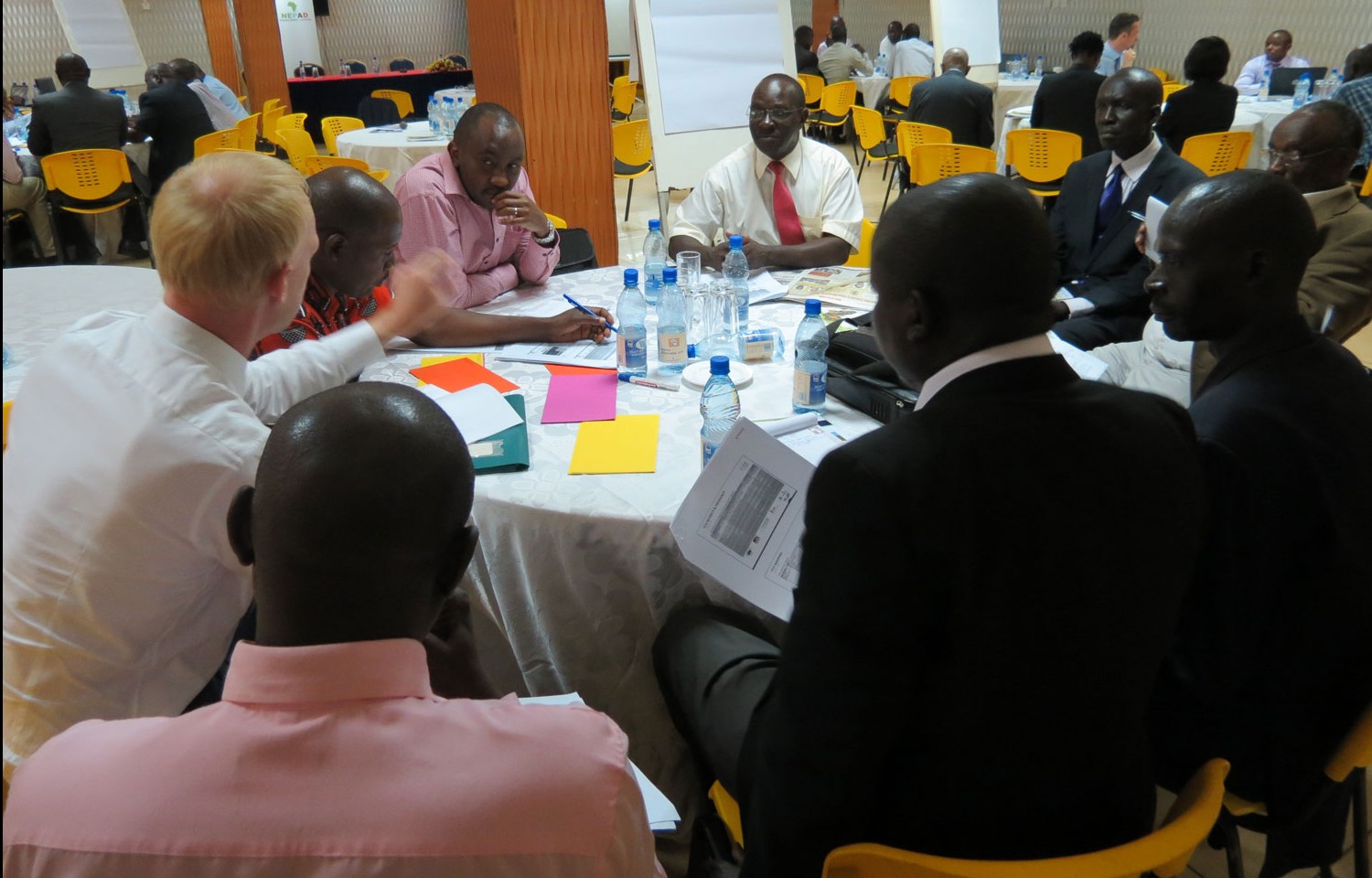
Participants during the working group session for risk prioritization
Next Steps
A Final Risk Assessment Study Report will be drafted incorporating the outcomes of the discussions and it will serve to identify the main focus for the feasibility studies and capacity development interventions that will lead the next steps in the (P)ARM process.
In addition, a Capacity Development Seminar has been conducted from 1 to 2 July 2015 by PARM, NEPAD and FAO in partnership with MAAIF with the main objectives to provide trainees with critical capacity to understand the meaning of holistic approach to analyze and manage the main agriculture risks affecting smallholders; to bring relevant experiences of the participants on ARM in Uganda and develop team building among key stakeholders on ARM; and to identify training needs of smallholder farmers to design a plan on capacity development on ARM in Uganda.
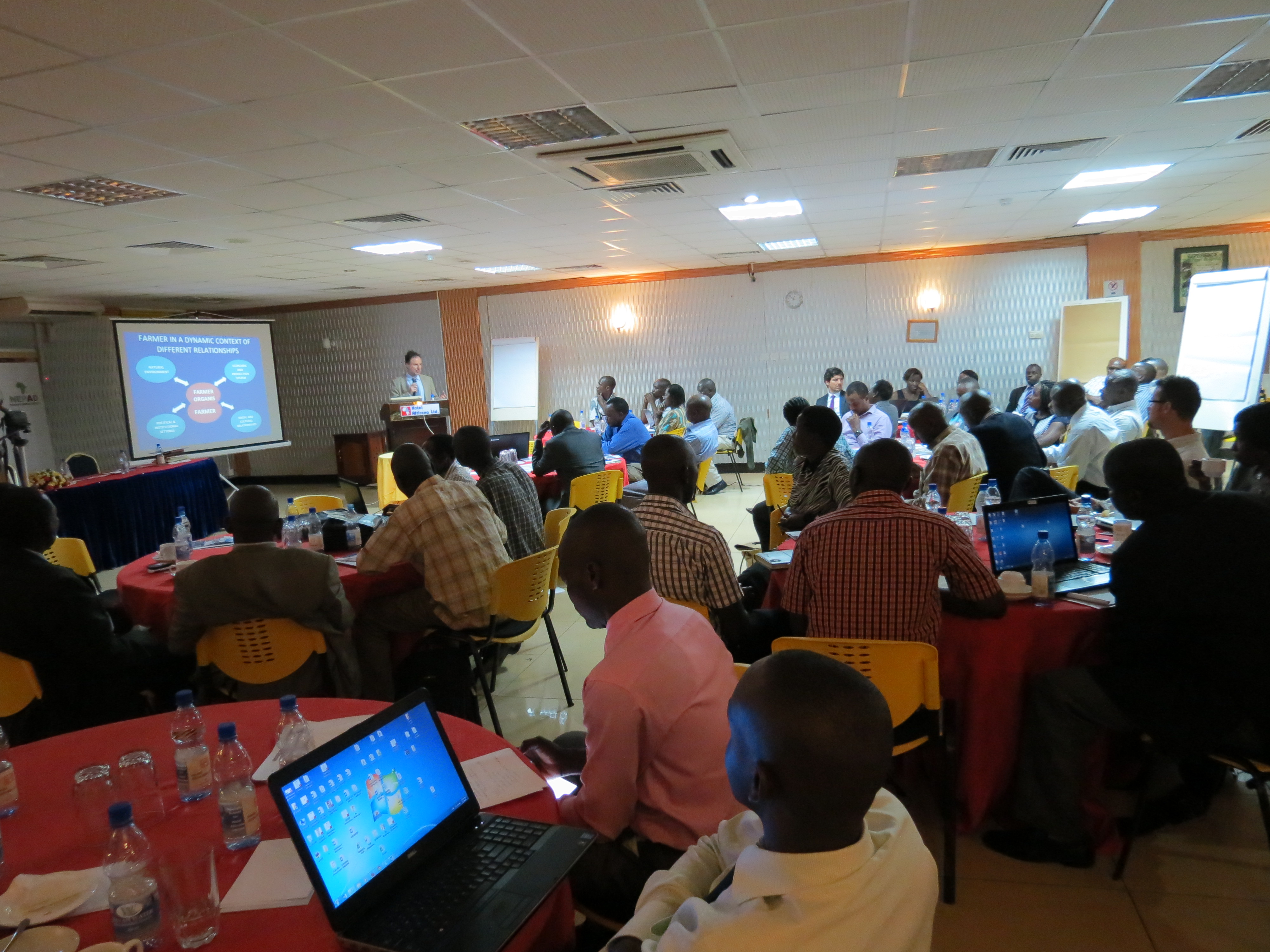
A National Steering Committee (NSC) inclusive of the main relevant stakeholders on ARM, also met on the 3 July to be informed about the results of the discussions and to guide the process that will lead to further integrate agricultural risk management into the national policy.
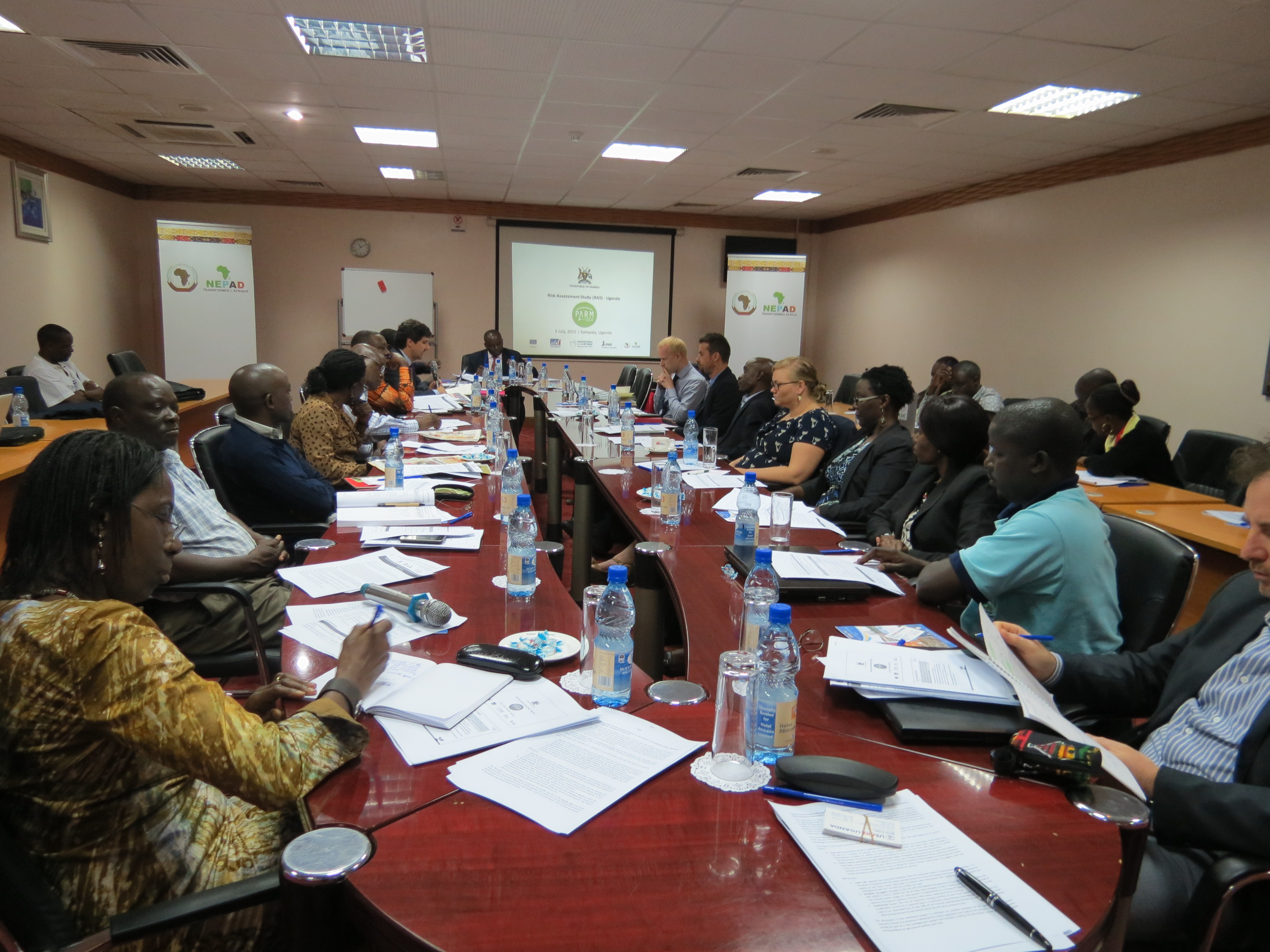
RELATED DOCUMENTS
RAS Validation Workshop Full Reports
Uganda RAS Validation Workshop – VOL.1 Main Report
Uganda RAS Validation Workshop – VOL.2 Presentations
Capacity Development Seminar Full Reports
Uganda Capacity Development Seminar – VOL.1 Main Report
Uganda Capacity Development Seminar – VOL.2 Presentations
